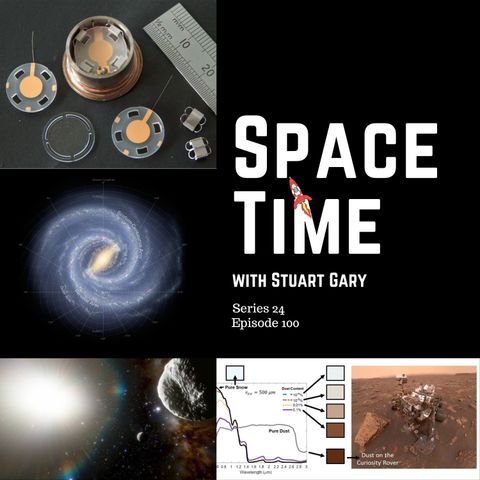Possible Detection of a New Type of Gravitational Wave
Sep 6, 2021 ·
34m 4s

Download and listen anywhere
Download your favorite episodes and enjoy them, wherever you are! Sign up or log in now to access offline listening.
Description
The Astronomy, Technology, and Space Science News Podcast. SpaceTime Series 24 Episode 100 *Possible detection of a new type of gravitational wave Scientists using a ground-breaking new high frequency gravitational...
show more
The Astronomy, Technology, and Space Science News Podcast.
SpaceTime Series 24 Episode 100
*Possible detection of a new type of gravitational wave
Scientists using a ground-breaking new high frequency gravitational wave detector have made two possible detections which are sparking a lot of excitement.
*A break discovered in one of the Milky Way’s spiral arms
Astronomers have discovered what appears to be a break in one of the Milky Way galaxy’s majestic spiral arms.
*The fastest asteroid ever seen
Astronomers have discovered the fastest asteroid ever seen. The kilometre wide space rock named 2021 PH27 – takes just 113 days to complete each orbit of the Sun.
*Martian snow is dusty
A new study has confirmed that Martian snow is very dusty. The findings reported in the Journal of Geophysical Research: Planets looked at the grain size of the dust in the red planet’s snow cover.
*The Science Report
Scientists have reported a potential new COVID-19 variant.
A new study claims people can change their sexual orientation after finding it’s really on a spectrum.
Two new species of dinosaurs discovered in the Appalachian mountains.
People are swearing less now than what they used to back in the 1990s.
Skeptic's guide to the Dunning–Kruger effect
For more SpaceTime and show links: https://linktr.ee/biteszHQ
Your support is needed...
SpaceTime is an independently produced podcast (we are not funded by any government grants, big organisations or companies), and we’re working towards becoming a completely listener supported show...meaning we can do away with the commercials and sponsors. We figure the time can be much better spent on researching and producing stories for you, rather than having to chase sponsors to help us pay the bills.
That's where you come in....help us reach our first 1,000 subscribers...at that level the show becomes financially viable and bills can be paid without us breaking into a sweat every month. Every little bit helps...even if you could contribute just $1 per month. It all adds up.
By signing up and becoming a supporter at the $5 or more level, you get immediate access to over 240 commercial-free, double, and triple episode editions of SpaceTime plus extended interview bonus content. You also receive all new episodes on a Monday rather than having to wait the week out. Subscribe via Patreon or Supercast (you get a month’s free trial with Supercast to see if it’s really for you or not)....and share in the rewards. Details at Patreon www.patreon.com/spacetimewithstuartgary or Supercast - https://bitesznetwork.supercast.tech/
Details at https://spacetimewithstuartgary.com or www.bitesz.com
show less
SpaceTime Series 24 Episode 100
*Possible detection of a new type of gravitational wave
Scientists using a ground-breaking new high frequency gravitational wave detector have made two possible detections which are sparking a lot of excitement.
*A break discovered in one of the Milky Way’s spiral arms
Astronomers have discovered what appears to be a break in one of the Milky Way galaxy’s majestic spiral arms.
*The fastest asteroid ever seen
Astronomers have discovered the fastest asteroid ever seen. The kilometre wide space rock named 2021 PH27 – takes just 113 days to complete each orbit of the Sun.
*Martian snow is dusty
A new study has confirmed that Martian snow is very dusty. The findings reported in the Journal of Geophysical Research: Planets looked at the grain size of the dust in the red planet’s snow cover.
*The Science Report
Scientists have reported a potential new COVID-19 variant.
A new study claims people can change their sexual orientation after finding it’s really on a spectrum.
Two new species of dinosaurs discovered in the Appalachian mountains.
People are swearing less now than what they used to back in the 1990s.
Skeptic's guide to the Dunning–Kruger effect
For more SpaceTime and show links: https://linktr.ee/biteszHQ
Your support is needed...
SpaceTime is an independently produced podcast (we are not funded by any government grants, big organisations or companies), and we’re working towards becoming a completely listener supported show...meaning we can do away with the commercials and sponsors. We figure the time can be much better spent on researching and producing stories for you, rather than having to chase sponsors to help us pay the bills.
That's where you come in....help us reach our first 1,000 subscribers...at that level the show becomes financially viable and bills can be paid without us breaking into a sweat every month. Every little bit helps...even if you could contribute just $1 per month. It all adds up.
By signing up and becoming a supporter at the $5 or more level, you get immediate access to over 240 commercial-free, double, and triple episode editions of SpaceTime plus extended interview bonus content. You also receive all new episodes on a Monday rather than having to wait the week out. Subscribe via Patreon or Supercast (you get a month’s free trial with Supercast to see if it’s really for you or not)....and share in the rewards. Details at Patreon www.patreon.com/spacetimewithstuartgary or Supercast - https://bitesznetwork.supercast.tech/
Details at https://spacetimewithstuartgary.com or www.bitesz.com
Information
| Author | bitesz.com |
| Organization | bitesz.com |
| Website | - |
| Tags |
Copyright 2024 - Spreaker Inc. an iHeartMedia Company
